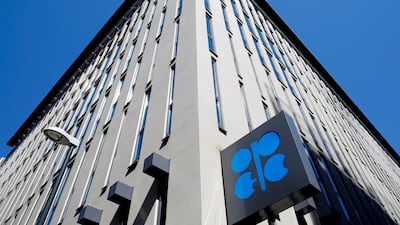Oil prices dropped on Wednesday after the Opec+ group of crude producers delayed its scheduled meeting, a move that surprised the markets.
The group postponed its Joint Ministerial Monitoring Committee as well as the Opec and non-Opec Ministerial Meeting, “originally planned” for November 25 and 26, to November 30. It did not give a reason for the delay in a brief statement posted on its website.
Brent, the global benchmark for two thirds of the world's oil, was trading 4.86 per cent down at $78.45 a barrel at 7.20pm UAE time on Wednesday. The West Texas Intermediate, the gauge that tracks US crude, was down 5.05 per cent at $73.84 a barrel.
The meeting of the Opec+ group of producers, led by Saudi Arabia – the world's biggest oil exporter – and Russia, was expected to chart the course of crude output cuts in 2024 and discuss any possible changes to their long-standing agreement aimed at stabilising the oil market.
"That the price plunged ... suggests traders believe there may not be full agreement on the scale of output cuts going into next year," said Craig Erlam, senior market analyst at Oanda.
"The group has successfully tightened the market over the past year or so" and have managed to push prices much higher in the process, he added.
However, "the main question the market is asking" is whether Opec and its allies will cut production further in response to softening oil prices, said Matt Sherwood, analyst of global forecasting at Economist Intelligence Unit, before the delay in the meeting was announced.
“These [prices] have returned to the levels they were at before the Israel-Hamas war broke out in early October."
Mr Sherwood did not expect Opec to announce any additional cuts "at least not beyond those already announced earlier this year" when the group agreed production quotas for 2024, he said.
oil prices have remained volatile since the beginning of the Israel-Gaza war as an escalation of the conflict beyond the Gaza border threatens to disrupt global energy supplies.
However, Oil has given up all gains since the start of the war as demand concerns outweigh the market uncertainties.
Oil has slumped for four straight weeks, scaling down from the near $98 per barrel level achieved in late September.
Opec in its last ministerial meeting decided to stick to its output policy.
The group has total production cuts in place of 3.66 million bpd, which includes a two million bpd reduction agreed on last year as well as voluntary cuts of 1.66 million bpd announced in April.
On November 5, Saudi Arabia and Russia said they would maintain their policy of output cuts of one million barrels per day until the end of this year, despite geopolitical uncertainty in the Middle East that roiled global energy markets.
Saudi Arabia said it would stick to its voluntary cut of one million bpd, which went into implementation in July 2023 and was later extended until the end of December, the state-run Saudi Press Agency said at the time.
Russia’s Deputy Prime Minister Alexander Novak echoed comments from Riyadh in a separate announcement.
"Russia will continue additional voluntary decrease of supplies of its oil and oil products to global markets by 300,000 barrels a day, which came into effect in September and October 2023, until late December 2023," Mr Novak said.
Markets largely expect Saudi Arabia to maintain its voluntary output caps.
Mr Sherwood said the kingdom will adhere to the cut it implemented in July and that it ultimately will extend the cut through the first quarter of 2024.

“We expect Opec to take a wait-and-see approach,” Mr Sherwood said.
“Ultimately, the physical market determines the spot price. On that front the market will remain tight in 2024 as global demand hits another all-time high and Opec continues to suppress production. We expect prices to remain on average above $80 per barrel in 2024.”
The tightening of the monetary policy by central banks to contain high inflation also affected oil prices.
The US commercial crude inventories have increased in the past four weeks and now stand at 440 million barrels, up from 420 million barrels a month ago, adding to the bearish sentiment in the market.
“Oil markets are eagerly awaiting the Opec+ meeting … in anticipation of what kingpin Saudi Arabia decides over its voluntary crude oil production cuts of one million barrels per day,” Rystad Energy’s senior vice president Jorge Leon said.

